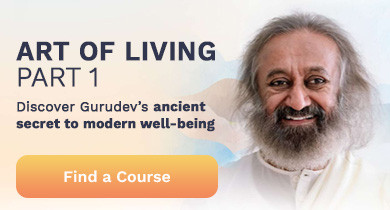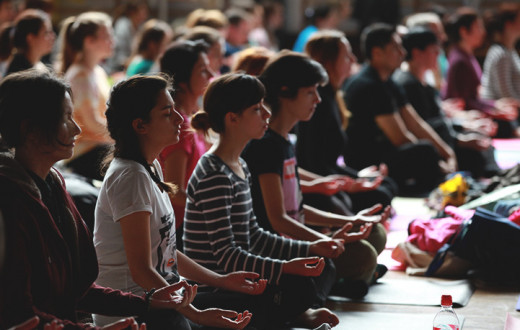By Elizabeth Herman | Posted: December 02, 2019
On November 12th, globally renowned spiritual master Gurudev Sri Sri Ravi Shankar, Founder of the Art of Living Foundation, was invited to the European Parliament (EU) in Brussels, Belgium to give a talk on “Meditation for Mediation.”
Starting the conversation, Ms Katarina Barley, member of the EU and former judge and government minister, welcomed Gurudev. In an enthusiastic way, she briefly mentioned her challenges resolving conflicts in the courts and in government during her career.
Meanwhile, in India a couple of days earlier (Saturday, November 9) a judgment was handed down in the Ayodhya case. As one of the mediators in an age-old conflict over religious use of land, Gurudev Sri Sri Ravi Shankar worked to bring the conflicting groups together for a win-win solution. Wanting to understand and learn more about his advocacy of meditation as supportive of the mediation process, the EU organized this conversation.
At one point in the second part of the talk, Gurdev stated, “Meditation changes our mindset from perceiving things with a stressed state of mind to bringing more clarity in our observation, perception, and in our expression. Whether it’s the mediator, or the people who are in conflict, it is important to take a few minutes to meditate on themselves, to reflect, to relax.”
A conversation with Europe’s leaders
The ambassador from India to the EU, Her Excellency Gaitri Issa Kumar, revealed that “He has just arrived after the momentous ruling of the Supreme Court of India, on a long standing land dispute over a specific place of worship in Ayodhya that has remained a very delicate issue. This very holy site has been claimed by the communities of two major religions. It was so sensitive that it couldn’t be solved for over 500 years. Gurudev was requested by the prime minister of India and most recently by the Supreme Court to help the concerned parties come to a solution.”
During the hour-long discussion, Gurudev Sri Sri Ravi Shankar said, "A judgment was like bringing a knife and cutting an apple into two halves and giving a half each to two people who are fighting for their rights. But the mediator doesn’t himself cut the apple.” This subtle distinction made clear the relationship between meditation, where no action is taken, and mediation, where again no action is taken but only facilitated for others who need to solve their own disputes.
Mediation and meditation
He started his talk by asking the dignitaries, “What is the relationship between mediation and meditation? What is mediation? What is meditation?
Let’s just ponder these two issues. Meditation is calming the mind down and going to the source of thought. Meditation isn’t an action; it’s a deep, conscious relaxation, which is the basis of all other actions.
Now, what is mediation? Mediation is being neutral and giving space for two communities or two parties, which are in conflict with each other. When all communication breaks down between two parties, the role of a mediator comes up.”
Cutting the apple: judgment vs. mediation
To illustrate the process of mediation, Gurudev uses the metaphor of dividing an apple and giving different parts of the apple to different people: “Suppose two persons are fighting for an apple. Judgment says ‘I cut the apple in half and give them each one half.’
But mediation means ‘I don’t take any decision.’ As a mediator, you simply facilitate people coming together.
So, as mediator, I would give the knife to one person to cut the apple, and the choices to somebody else. However, if I cut it myself and say it’s correct, then problems arise because one party will say ‘No, I got less,’ and the other party will say ‘I got more.’
But if I give the cutting to one person and choosing to someone else, the one who cuts the apple will cut it unjustly and the person who chooses already knows that. So, this attitude, of allowing the two parties to come together and rebuild the lost trust, is very, very difficult and challenging, but it isn’t impossible. To do this we need to be in a very calm, serene state.
For others to listen to you, first you must listen to them. First, what I would say is with both parties or one party at a time, you have to sit with them and listen to them before you try to make them listen to you. So once you listen to them and give a good hearing to them, then they are open to listening to you. But for this, the person has to be in a very calm state of mind, and have a lot of patience.”
The Ayodhya case
He continued, “In the recent Ayodhya case, I was to sit in the morning after breakfast around 9 o’clock, and the meeting would go almost the whole day with a lunch break of about 45 minutes, and then we’d go until 8 o’clock; this was the very first time that a case of national importance between leaders of two faith groups or religions was put under mediation.
Never before in the history of the world has this happened, ever. Mediation has happened between just two parties. Either it’s corporate or about property rights. Not on an issue as big as this, which has changed the history of India, the largest democracy of the world. So there were 25 parties and we had to hear every one of them.
And there was no time limit. We couldn’t tell them, ‘You shut up, or finish it.’ Because then they’d go home saying, ‘We haven’t been heard.’ We had to give a patient hearing to them the whole time. Sometimes it could be repetitive. People would come up with ‘In 1528, Barber came to India as an invalid.’ It could start from there. But you have to simply be attentive and listen to them. And when you listen to them, then what we found, with the honorable judges and the most respected members of the committee, was that the people are willing to cooperate.
They’re willing to consider others’ point of view. They’re willing to move ahead for the betterment of all. An atmosphere of cordiality was generated. On this, we met many, many spiritual leaders and hundreds of spiritual and religious leaders from both sides. All that contributed to creating an atmosphere of acceptance, of give and take, and of moving forward.
We’re very proud today of those settlement details that we submitted to the Supreme Court, and they gave a judgment which has been welcomed by one and all. An issue that was burning (71 wars were fought, big and small on this issue) for the last so many centuries was put to rest. People of both communities are celebrating.”
Gurudev Sri Sri Ravi Shankar has successively played the role of mediator to help resolve many other international conflicts. In the second part of my article, I share his own reflections on his mediation efforts in the South American countries of Colombia and Venezuela. Through all of his accomplishments, Gurudev emphasizes how meditation has played a key role in creating peace and possibilities for peace and healing throughout every corner of the world.
Elizabeth Herman writes, offers writing support to clients, teaches, and volunteers for a better world. She has a PhD in Rhetoric, Composition and Literature. Find her on Facebook or Twitter.



















